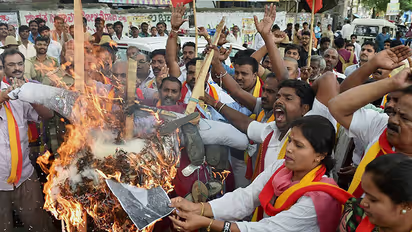
On the afternoon of August 18, BJP MP from Bengaluru South, Tejasvi Surya tweeted, condemning the attack on an event organised by Jain brothers in the city by a few “rowdy elements” who, in his view, incline lesser towards language than they do towards vandalism. He further added, fearless of citing a controversy, that poets like Pampa, Ponna and Ranna have been contributors to Kannada literature in a scale unprecedented.
This soon spiralled into a controversy where the pro-Kannada activists demanded that the MP apologise. Some even went as far as demanding his resignation.
Also read: Kumaraswamy seeks release of Kannada activists accused of vandalising Hindi hoardings
For starters, I personally believe that every resident Kannadiga must consider it a duty to learn the language and to encourage the use of it in every possible manner.
Having said that, it is important to dutifully examine all the elements involved in the incident that took place in Bengaluru where Jain Muni Upadhyay Shri Praveen Rishi ji was conducting a workshop. Any social/political organisation has the right to protest and dissent over an issue that concerns the society-at-large, as long as there is rationality and no use of untoward means such as vandalism or violence. This brings on table some amount of social equity that becomes an inherent responsibility of such groups.
It is imperative that one avoids an inherent bias in their pursuit of natural justice through a social organisation. In the end, the Constitution guarantees every citizen the right to express his/her views on what is important to the lives of citizens.
Speaking of bias, in January this year, there was a protest organised by pro-Kannada groups and BJP councillors outside the Kalburgi City Corporation against the usage of an Urdu nameplate. While one might wonder how this amounts to hypocrisy, the activists then pointed out that the nameplates were in Kannada earlier, but was changed to Urdu and English after a decision was taken internally.
A year ago, the Muslim League Welfare Society protested the Mayor’s choice of not displaying an Urdu nameplate, furthermore, asking for English and Kannada nameplates to be removed.
The existence of pro-Kannada organisations and activism is an integral part of this state and there is a need to preserve the language and literature. But one must concur that the behaviour exhibited by these activists reflect a lot on the overall imagery of Kannadigas since they are the foremost torchbearers of this language and its heritage, so I can only hope that my comments are taken constructively, and not portrayed as being anti-Kannada, like in the case of Tejasvi.
In the field of activism, more often than not, one tries to lobby for a political mileage. In this case, we need to pay additional heed to such elements since they do more damage than good to the language and its people. If one has to take a legal angle to this incident, it is true that the shops and commercial establishments must also have a signboard in the local language, but this didn’t even in anyway qualify to break the rules laid down in the Karnataka Municipal Corporations Act or as prescribed by the Bruhat Bengaluru Mahanagara Palike.
An event of this nature does not fit into the definition of a shop or a commercial establishment, so where does the question of a signboard in Kannada arise? It was merely a welcome hoarding of a religious ceremony that has been supported well within their fundamental rights of expression and religion under the Constitution.
There are a few fundamentally perturbing questions that arise with the incidents that have been witnessed in the few years where violence has superseded logic. The commitment to such a cause should be a complete circle. Saving government schools from poor infrastructure, low turnout, high dropouts must be made a priority. The border areas like Kasaragod, Belagavi, Ballari where the presence of Kannadigas are threatened by non-Kannadigas requires the presence of these activists, rather than South Bengaluru, which has been a culturally rich area since centuries now.
After all, before one protests the use of Devanagari script, we must acknowledge that the Nandinagari script was once used extensively in the South, including the Vijayanagara empire as well. The Jains in no way need to prove their test of loyalty towards Kannada or Karnataka.
I genuinely hope that this provides a room for reflection about our attitude towards the language.